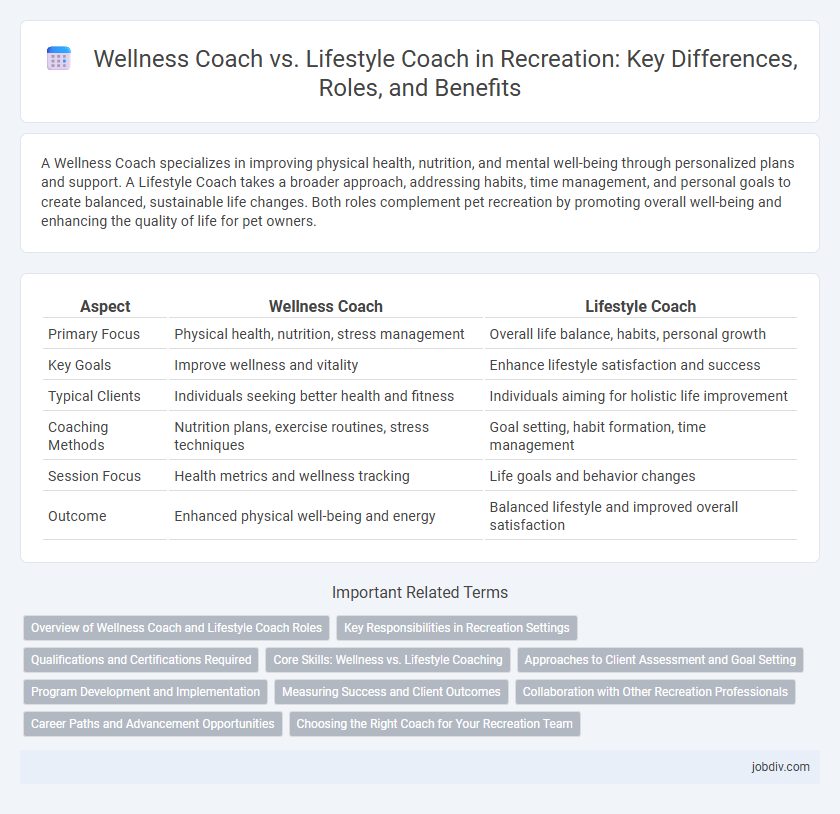A Wellness Coach specializes in improving physical health, nutrition, and mental well-being through personalized plans and support. A Lifestyle Coach takes a broader approach, addressing habits, time management, and personal goals to create balanced, sustainable life changes. Both roles complement pet recreation by promoting overall well-being and enhancing the quality of life for pet owners.
Table of Comparison
| Aspect | Wellness Coach | Lifestyle Coach |
|---|---|---|
| Primary Focus | Physical health, nutrition, stress management | Overall life balance, habits, personal growth |
| Key Goals | Improve wellness and vitality | Enhance lifestyle satisfaction and success |
| Typical Clients | Individuals seeking better health and fitness | Individuals aiming for holistic life improvement |
| Coaching Methods | Nutrition plans, exercise routines, stress techniques | Goal setting, habit formation, time management |
| Session Focus | Health metrics and wellness tracking | Life goals and behavior changes |
| Outcome | Enhanced physical well-being and energy | Balanced lifestyle and improved overall satisfaction |
Overview of Wellness Coach and Lifestyle Coach Roles
Wellness coaches specialize in guiding clients toward improved physical health, nutrition, and stress management through personalized plans that promote holistic well-being. Lifestyle coaches focus on broader behavioral changes, including time management, work-life balance, and goal setting to enhance overall life satisfaction. Both roles aim to empower individuals, but wellness coaching centers primarily on health-related outcomes while lifestyle coaching addresses comprehensive personal development.
Key Responsibilities in Recreation Settings
Wellness Coaches primarily focus on creating personalized fitness and nutrition plans that promote physical health and mental well-being in recreational settings. Lifestyle Coaches emphasize behavior modification strategies, stress management, and goal-setting techniques to support overall life balance and motivation during leisure activities. Both roles collaborate to enhance clients' engagement in recreational pursuits while fostering sustainable healthy habits.
Qualifications and Certifications Required
Wellness coaches typically require certifications from accredited organizations such as the National Board for Health and Wellness Coaching (NBHWC) or the International Consortium for Health & Wellness Coaching (ICHWC), emphasizing health behavior change and holistic well-being strategies. Lifestyle coaches often hold certifications in life coaching from bodies like the International Coach Federation (ICF) or the Center for Credentialing & Education (CCE), focusing on personal development, time management, and goal setting. Both roles may benefit from additional qualifications in nutrition, fitness, or mental health to enhance client support and outcomes.
Core Skills: Wellness vs. Lifestyle Coaching
Wellness coaching emphasizes expertise in nutrition, fitness, stress management, and mental health to support clients in achieving holistic well-being. Lifestyle coaching focuses on goal setting, habit formation, time management, and personal development to foster sustainable behavior changes across various life domains. Core skills in wellness coaching prioritize physical and emotional health, while lifestyle coaching centers on motivation and life balance.
Approaches to Client Assessment and Goal Setting
Wellness coaches prioritize holistic client assessments including physical health, nutrition, and stress levels to create personalized well-being plans. Lifestyle coaches evaluate broader life aspects such as habits, routines, and environmental factors to support sustainable behavioral changes. Both utilize goal-setting techniques like SMART objectives but tailor them to distinct client needs and progress measurements.
Program Development and Implementation
Wellness coaches specialize in designing and implementing programs that target physical health, nutrition, and stress management, offering personalized plans based on scientific wellness principles. Lifestyle coaches develop comprehensive programs addressing broader aspects such as habit formation, time management, and overall life balance, integrating behavioral change techniques to support long-term success. Both roles emphasize tailored strategies, but wellness coaching centers on health metrics, while lifestyle coaching incorporates diverse areas influencing daily living.
Measuring Success and Client Outcomes
Wellness coaches measure success through holistic indicators like improved physical health, stress reduction, and enhanced well-being, often using biometric data and client self-assessments to track progress. Lifestyle coaches focus on behavioral changes tied to personal goals, evaluating outcomes by shifts in daily routines, productivity, and overall life satisfaction. Both disciplines prioritize client-centered metrics but differ in their approach to quantifying success based on health versus lifestyle improvements.
Collaboration with Other Recreation Professionals
Wellness coaches collaborate closely with fitness trainers, nutritionists, and mental health practitioners to create comprehensive health plans that address physical, emotional, and nutritional needs. Lifestyle coaches often work alongside career advisors, stress management experts, and recreational therapists to support clients in achieving balanced daily routines and long-term personal goals. Effective teamwork among these recreation professionals enhances client outcomes by integrating diverse expertise into personalized wellness strategies.
Career Paths and Advancement Opportunities
Wellness coaches specialize in holistic health, often advancing into roles like clinical wellness director or corporate wellness consultant, leveraging certifications in nutrition, fitness, and mental health. Lifestyle coaches focus on behavior change and life design, with career paths leading to leadership positions in life coaching organizations or private practice expansion through niche certifications. Both fields offer opportunities for professional growth through continuing education and specialization in areas such as stress management, executive coaching, or holistic wellness integration.
Choosing the Right Coach for Your Recreation Team
Selecting the right coach for your recreation team hinges on understanding the distinction between a wellness coach and a lifestyle coach. Wellness coaches specialize in improving physical health, nutrition, and fitness, making them ideal for teams aiming to enhance athletic performance and injury prevention. Lifestyle coaches focus on overall life balance, stress management, and personal growth, which benefits teams seeking improved mental resilience and team cohesion.
Wellness Coach vs Lifestyle Coach Infographic

 jobdiv.com
jobdiv.com